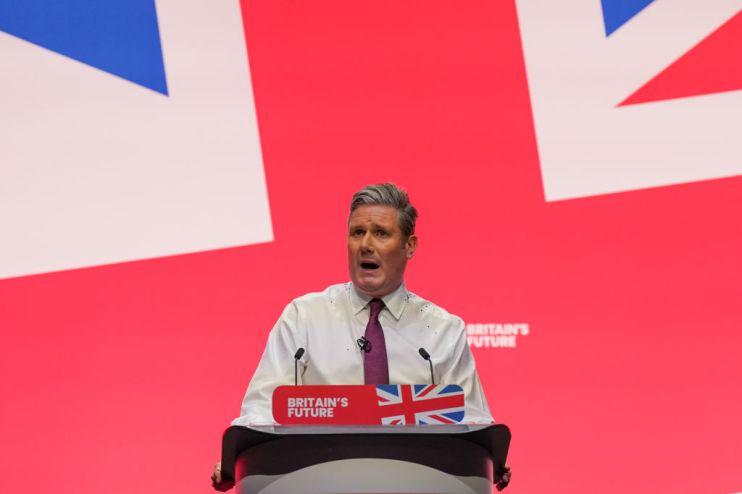Voters are sick of political slogans, but Sunak and Starmer just won’t let go

Sunak and Starmer are obsessed with slogans, but voters see right through them and they are making politics meaningless, writes Eliot Wilson
Sometimes it feels like 1996 again. Sir Keir Starmer must find it a comforting nostalgia: a long-serving Conservative government looks tired, plagued by forced and unforced errors, a General Election is only months away and the opinion polls consistently show that the Labour Party will gallop to victory.
Last week Labour headquarters sent out a “campaigning bible” to the party’s candidates. “Let’s Get Britain’s Future Back” is a glossy 24-page document which teems with slogans and punchy phrases which activists can use to hammer home a consistent, coherent, disciplined message. The slickness, the calculation and the straightforwardness are in some ways the final triumph of New Labour, the culmination of everything that Sir Tony Blair and Lord Mandelson worked so hard to create 30 years ago.
Labour isn’t unique in this. The Conservatives have developed a range of slogans, from “Stop the boats” to the tortured “Long-term decisions for a brighter future”. The Prime Minister currently favours a positive-and-negative one-two urging voters to “Stick to the plan” rather than going “Back to square one”. At a press conference in Downing Street last week, after the Safety of Rwanda (Asylum and Immigration) Bill had passed the House of Commons, Rishi Sunak used “stick to the plan” 15 times, and “back to square one” eight times. In 27 minutes.
The public notices this, but not necessarily in the way that communications gurus want. The 1990s notion of “message discipline” is now being overwhelmed by irritation and impatience. Voters now hear politicians using a register which has become remote and artificial, so unlike the way that people talk in real life that it is inauthentic and cynical. It is as if we can now see the joins: the way which slogans are designed to elicit a specific response is obvious, and that robs the trick of its magic.
We now look at an unappetising, hollow performance. Sunak and Starmer are equipped with their slogans and know, or believe, that they are more powerful with repetition, so they are used as bludgeons, and the result is not a debate. It is an exchange of pre-prepared snippets and phrases, and they sail past each other. There is simply no engagement, and our leaders look self-absorbed, deaf to arguments and evasive.
“Ah,” you will say, “but look at the Brexit referendum! Didn’t ‘Take back control’ win it?” Or you might point to the Conservative victory at 2019’s General Election, underpinned by the simplicity of “Get Brexit done”.
The stakes are higher than that. Is it really a coincidence that we, as an electorate, are as cynical as we have ever been about politics? That trust in politicians is so low? According to a recent survey, only nine per cent of us think they will tell the truth. Of course there are many reasons for this dreadful state of affairs, not least the inability of so many of our elected representatives to recognise ethics or propriety in a line-up. But this relentless simplification and repetition, the electioneering equivalent of strategic bombing, has played an enormous part.
Politicians are not, in the main, especially courageous people. It is much easier to try to do better something which others have already done than to strike out on a different course. This means that Sunak and Starmer, like those who have gone before them, rely on the methods of the past. But the audience has changed, and it is sour and weary.
This does not mean that we need a leader who will play out some strange political version of Jim Carrey’s involuntary truth-teller in 1997’s Liar Liar. Politicians have to seize a narrow window in the electorate’s attention and make the most of it. But we have arrived at a place where they seem isolated, remote and unwilling to listen. This has to change, or the whole system will fade into contemptible irrelevance.
Joining a political party is now a minority pursuit. Maybe a million of us have joined any of them. So the idea of a monopoly of truth is simply dead. The lesson: drop the slogans. Answer the question. Listen to the answer. It’s how the rest of us act every day, and it could change the way we look at our leaders.